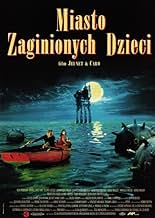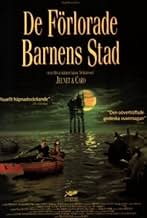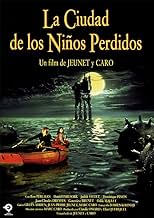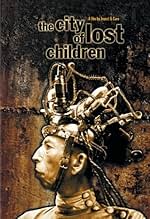Uno scienziato che vive in una società surrealista rapisce i bambini per rubarne i sogni, sperando che questo rallenti il suo processo di invecchiamento.Uno scienziato che vive in una società surrealista rapisce i bambini per rubarne i sogni, sperando che questo rallenti il suo processo di invecchiamento.Uno scienziato che vive in una società surrealista rapisce i bambini per rubarne i sogni, sperando che questo rallenti il suo processo di invecchiamento.
- Regia
- Sceneggiatura
- Star
- Premi
- 5 vittorie e 14 candidature totali
Geneviève Brunet
- La Pieuvre
- (as Genevieve Brunet)
Mapi Galán
- Lune
- (as Mapi Galan)
Briac Barthélémy
- Bottle
- (as Briac Barthelemy)
Léo Rubion
- Jeannot
- (as Leo Rubion)
Recensioni in evidenza
10presence
The City of Lost Children is my all time favorite movie. It is unlike anything I've ever seen or experienced before. It's a movie that I hold dear to my heart and will never forget. I have to be honest though, the first time I saw this movie, I really didn't like it at all. The story was too confusing, and the characters were extremely weird and twisted. After watching it a second and third time, however, I understood what was going on more, and could spend more time looking at the visuals rather than the subtitles. Speaking of visuals, this movie has it in spades. The environment that Jean-Pierre Jeunet created is out of this world. The city is very dark and the water looks as if there are secrets hidden within. The mood the soundtrack sets is perfect for the scenery and the superb acting by everybody (including the kids) just adds to the greatness of this flick. I highly recommend this movie, it's one of those movies that you will never forget watching, and the images will stay in your head for a very long time. A beautiful, beautiful, movie. 10/10
Many disagree with the previous reviewer.
Not sure what the last reviewer watched, but City of lost Children is amazing cinema from the sets, color, acting, lighting, plot, it had everything pushed to the Nth from what I experienced.
It is NOT a typical American style movie. It is French and luckily, they are allowed to have an alternate path to interesting movie making.
This guy Jeunet puts a LOT into all of his productions. Almost a mentally overwhelming amount of style, info and actions (not action packed, but activities that go on in or behind the scene). He also did Amelie which is just as astounding and one of the best films ever made. Watch it start to finish if you don't believe that.
The City of Lost Childen extends its name sake across many peoples from the twisted characters that are adults and act like the children they never were, to the children who are lost from being children and must be adults. Not to mention the abductions and the reason for that.
So it is a win on many levels. One of the best, and I am so grateful I happened across this bazaar gem of a flick.
Wish more movies were as intricately entertaining as this art piece is.
Not sure what the last reviewer watched, but City of lost Children is amazing cinema from the sets, color, acting, lighting, plot, it had everything pushed to the Nth from what I experienced.
It is NOT a typical American style movie. It is French and luckily, they are allowed to have an alternate path to interesting movie making.
This guy Jeunet puts a LOT into all of his productions. Almost a mentally overwhelming amount of style, info and actions (not action packed, but activities that go on in or behind the scene). He also did Amelie which is just as astounding and one of the best films ever made. Watch it start to finish if you don't believe that.
The City of Lost Childen extends its name sake across many peoples from the twisted characters that are adults and act like the children they never were, to the children who are lost from being children and must be adults. Not to mention the abductions and the reason for that.
So it is a win on many levels. One of the best, and I am so grateful I happened across this bazaar gem of a flick.
Wish more movies were as intricately entertaining as this art piece is.
The City of Lost Children gets two platinum stars and also moves up to one of my top ten favorite films of all time. This is a confusing story, from beginning to end it expands your mind, reaches into your nightmares, and creates a story that is part Dark City and part of a novel called "The Golden Compass" by Phillip Pullman.
Yes, this film was everything and more. Not only visually beautiful, but the creative and symbolic meaning of the actions and words of the characters are "jaw dropping". Also, there are so many sub-stories in this film that reminded me of the style that Run Lola Run was done. This is the style that due to a connection of unrelated events something extraordinary happens. Let me give you an example from this film: There is a scene where the girl and One (Ron Pearlman-also a very biblical name) are trying to escape from the two women who want their jewels. There are events that lead from a dog finding its female companion to a boat almost hitting/splitting the women in half. Wild coincidences...imagine this times ten, and you have this film.
Keep in mind this is a French film with English subtitles, so you are not only getting the true voice of the film, but seeing the darkness of the cinematography without any American input. This really shows the purpose behind making this film, it really takes you to a new place so dark and dreamlike that you the viewer actually feel like you are in the picture itself. A movie about dreams and nightmares that takes place in a world of dreams and nightmares.
Overall, a heavily religious and symbolic film, The City of Lost Children should be put at the top of your foreign film list. Put it in your DVD player, open your mind, and be ready for a wild and intense ride!!
Grade: ***** out of *****
Yes, this film was everything and more. Not only visually beautiful, but the creative and symbolic meaning of the actions and words of the characters are "jaw dropping". Also, there are so many sub-stories in this film that reminded me of the style that Run Lola Run was done. This is the style that due to a connection of unrelated events something extraordinary happens. Let me give you an example from this film: There is a scene where the girl and One (Ron Pearlman-also a very biblical name) are trying to escape from the two women who want their jewels. There are events that lead from a dog finding its female companion to a boat almost hitting/splitting the women in half. Wild coincidences...imagine this times ten, and you have this film.
Keep in mind this is a French film with English subtitles, so you are not only getting the true voice of the film, but seeing the darkness of the cinematography without any American input. This really shows the purpose behind making this film, it really takes you to a new place so dark and dreamlike that you the viewer actually feel like you are in the picture itself. A movie about dreams and nightmares that takes place in a world of dreams and nightmares.
Overall, a heavily religious and symbolic film, The City of Lost Children should be put at the top of your foreign film list. Put it in your DVD player, open your mind, and be ready for a wild and intense ride!!
Grade: ***** out of *****
I can't help myself: I adore this film. I freely accept that it's not going to be everyone's cup of tea; if pushed, I might even accept that it's not perfect. But there's no film I love more, or more enjoy re-watching. One caveat though: I've seen both the subtitled and the dubbed print, and the English dubbing frankly comes close to ruining the movie. Ron Perlman dubs himself and is fine, and some of the other adult English actors are perfectly OK, though they tend to be blander than the French originals. But most of the children are terrible, and with her own voice it's Judith Vittet's extraordinary performance (all the more extraordinary considering she was nine at the time) that helps give "La Cité" the genuine emotional centre that some viewers don't feel it has.
But I'll come back to that. In any version, at least Jeunet and Caro's astonishing visual flair and artistry come over. I can't think of a film that has such a concentration of memorable shots - time and again, especially watching on DVD with a freeze-frame facility, you realize how many beautiful compositions Jean-Pierre Jeunet gives us: though the cast of characters could easily fill a freak show, and the sets are dark and quite unglamorous in themselves, the cinematography is gorgeous and the mise-en-scène often strangely elegant. It has a look all of its own, perfect for a modern, urban fairy-tale. The music too is gorgeous, one of the finest scores by David Lynch's regular musical collaborator, Angelo Badalamenti.
"Fairy tale" is I think the best generic starting-point for this film, so long as you think Grimm rather than Disney. (Unlike "Delicatessen", it isn't really a comedy, though it has comic elements). And the plot works according to its own logic, even if the progression from scene to scene is occasionally a bit lumpy or obscure. Krank (the astonishing Daniel Emilfork), grown prematurely old because he cannot dream, uses a cult of blind, messianic preachers to abduct children from a decaying industrial port and steal their dreams - but they have only nightmares, and Krank falls ever deeper into despair and evil. It's up to the orphan pickpocket Miette and a none-too-brainy circus strongman, One, to put a stop to him. This rich idea is elaborated with all sorts of visual conceits and eccentric characters - Jeunet mounts, for example, a couple of astonishing sequences in which chains of unlikely effects proceed from the smallest of causes - but never at the expense of the central relationship of One and Miette.
In a sense Miette, like Krank, has grown old too fast: the orphaned street-children of this city are savvy and unsentimental, and never seem to have had a childhood; meanwhile there's something deeply childish, in various ways, about most of the adults. Sensitively directed and never overacting, Judith Vittet's Miette gradually thaws, and Ron Perlman brings a lot of sympathy and pathos to what could have been an oafish, cartoonish role: Jeunet gives plenty of space and subtlety to their gradually-developing friendship, and dares to do what I suspect no English director would dare to do at the moment, which is to make their relationship innocently sexualized. Neither of them is really a grown-up, but it's still an extremely risky move, exploring the first stirrings of pre-pubescent sexuality while trying not to be exploitative or prurient. I do think the film pulls it off, though I can imagine some viewers feeling distinctly uncomfortable with it. For me it's one of the most convincingly unsentimental and nuanced (if mannered) portrayals of childhood I've ever seen on the screen, and there is real compassion and tenderness along the way, as well as some darker twists and turns.
It's a film that rewards analysis if you're prepared to surrender to its strange world with its strange rules. But it rewards the senses and the emotions too - and it radiates love of cinema as the perfect medium for sophisticated fantasy. One elderly actress who appears towards the end (Nane Germon) acted - as Jeunet's DVD commentary points out - in Jean Cocteau's "La Belle et la Bête" about fifty years earlier (there are, by the way, distinct references to the Beauty and the Beast story here), and "La Cité des enfants perdus" deserves to join that film as one of the classic cinematic fairy-tales. Pity about Marianne Faithfull over the closing credits, though!
But I'll come back to that. In any version, at least Jeunet and Caro's astonishing visual flair and artistry come over. I can't think of a film that has such a concentration of memorable shots - time and again, especially watching on DVD with a freeze-frame facility, you realize how many beautiful compositions Jean-Pierre Jeunet gives us: though the cast of characters could easily fill a freak show, and the sets are dark and quite unglamorous in themselves, the cinematography is gorgeous and the mise-en-scène often strangely elegant. It has a look all of its own, perfect for a modern, urban fairy-tale. The music too is gorgeous, one of the finest scores by David Lynch's regular musical collaborator, Angelo Badalamenti.
"Fairy tale" is I think the best generic starting-point for this film, so long as you think Grimm rather than Disney. (Unlike "Delicatessen", it isn't really a comedy, though it has comic elements). And the plot works according to its own logic, even if the progression from scene to scene is occasionally a bit lumpy or obscure. Krank (the astonishing Daniel Emilfork), grown prematurely old because he cannot dream, uses a cult of blind, messianic preachers to abduct children from a decaying industrial port and steal their dreams - but they have only nightmares, and Krank falls ever deeper into despair and evil. It's up to the orphan pickpocket Miette and a none-too-brainy circus strongman, One, to put a stop to him. This rich idea is elaborated with all sorts of visual conceits and eccentric characters - Jeunet mounts, for example, a couple of astonishing sequences in which chains of unlikely effects proceed from the smallest of causes - but never at the expense of the central relationship of One and Miette.
In a sense Miette, like Krank, has grown old too fast: the orphaned street-children of this city are savvy and unsentimental, and never seem to have had a childhood; meanwhile there's something deeply childish, in various ways, about most of the adults. Sensitively directed and never overacting, Judith Vittet's Miette gradually thaws, and Ron Perlman brings a lot of sympathy and pathos to what could have been an oafish, cartoonish role: Jeunet gives plenty of space and subtlety to their gradually-developing friendship, and dares to do what I suspect no English director would dare to do at the moment, which is to make their relationship innocently sexualized. Neither of them is really a grown-up, but it's still an extremely risky move, exploring the first stirrings of pre-pubescent sexuality while trying not to be exploitative or prurient. I do think the film pulls it off, though I can imagine some viewers feeling distinctly uncomfortable with it. For me it's one of the most convincingly unsentimental and nuanced (if mannered) portrayals of childhood I've ever seen on the screen, and there is real compassion and tenderness along the way, as well as some darker twists and turns.
It's a film that rewards analysis if you're prepared to surrender to its strange world with its strange rules. But it rewards the senses and the emotions too - and it radiates love of cinema as the perfect medium for sophisticated fantasy. One elderly actress who appears towards the end (Nane Germon) acted - as Jeunet's DVD commentary points out - in Jean Cocteau's "La Belle et la Bête" about fifty years earlier (there are, by the way, distinct references to the Beauty and the Beast story here), and "La Cité des enfants perdus" deserves to join that film as one of the classic cinematic fairy-tales. Pity about Marianne Faithfull over the closing credits, though!
The first time I saw this movie I shook my head and wondered why I wasted three dollars renting this movie. It seemed to me that the storyline was worthless. However, I gave this movie a second chance, and this time instead of constantly reading the subtitles I paid more attention to the acting and events taking place on-screen.
I was shocked. The amount of creativity and symbolism blew me away. A lot of questions I had accumulated throughout my first viewing were answered by watching the movie carefully.
I recommend to everyone who thought this a poor movie to watch it again. If you don't speak French (like myself) try not to get so involved in the subtitles that you miss critical detail. It's there, and it's important, trust me!
I was shocked. The amount of creativity and symbolism blew me away. A lot of questions I had accumulated throughout my first viewing were answered by watching the movie carefully.
I recommend to everyone who thought this a poor movie to watch it again. If you don't speak French (like myself) try not to get so involved in the subtitles that you miss critical detail. It's there, and it's important, trust me!
Lo sapevi?
- QuizTo achieve the slightly skewed color scheme of the movie, the actors were made up in white face and the color palette corrected until they were flesh-toned.
- BlooperThe words from The Original that Miette remembers in flashback (after she receives Uncle Irvin's dream message) differ slightly from what The Original actually said, although the point of the message is still the same.
- Citazioni
[after Mlle. Bismuth has been harpooned]
Clone: Does it hurt?
Mlle. Bismuth: Yes, I'm allergic to steel.
- Versioni alternativeThere are two different audio tracks for the film - one is the original French language version and another is an English language dub.
- ConnessioniFeatured in Les enfants de la cité perdue (1995)
- Colonne sonoreWho Will Take Your Dreams Away
Music by Angelo Badalamenti
Lyrics by Marianne Faithfull
Performed by Marianne Faithfull
I più visti
Accedi per valutare e creare un elenco di titoli salvati per ottenere consigli personalizzati
Dettagli
- Data di uscita
- Paesi di origine
- Siti ufficiali
- Lingue
- Celebre anche come
- La ciudad de los niños perdidos
- Luoghi delle riprese
- Aziende produttrici
- Vedi altri crediti dell’azienda su IMDbPro
Botteghino
- Budget
- 18.000.000 USD (previsto)
- Lordo Stati Uniti e Canada
- 1.738.611 USD
- Fine settimana di apertura Stati Uniti e Canada
- 34.348 USD
- 17 dic 1995
- Lordo in tutto il mondo
- 1.784.338 USD
Contribuisci a questa pagina
Suggerisci una modifica o aggiungi i contenuti mancanti



































